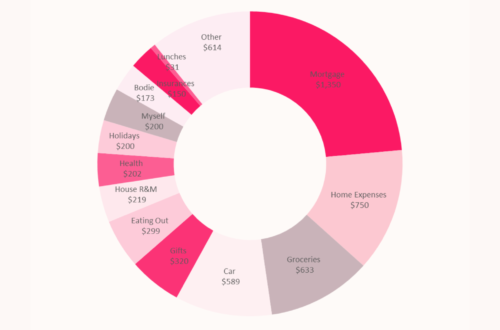
My Goals for 2024 – Plus How I Set Them (and Achieve Them)
Maybe it’s a first child thing, or a perfectionist thing (or a female thing?) but I have always been a goal setter.
I used to set BIG goals for milestone birthdays – 30 things to do before I am 30 (learn Cantonese and start the adoption process was 2 things on that list… alongside stay in a castle and attend a movie premiere – it was quite the eclectic list)
And at the start of each year I liked to set 3 goals for my career, 3 personal goals and 3 things to look forward to.
I never wanted to be stagnant, or for a year to slip by and for me to be left wondering where it went.
Plus, I like lists and ticking them off.
But since turning 40 (and having something of a midlife crisis) my goals have shifted significantly.
I have begun setting goals that really put me out of my comfort zone. My life coach calls them ‘impossible goals’ not because they are actually impossible but because my brain doesn’t think they are possible for me. So, they are the kind of goals that blow my mind if I achieve them.
And notice I say “if” here. Because the setting of these impossible goals isn’t about the achieving of them. It’s about the person I must become to get anywhere close to achieving them.
It’s about the new skills I have to learn.
The habits I need to create.
The people I have to meet and the relationships I will need to form.
The time and effort I must put in.
The things I might have to give up!
All of these go into achieving an impossible goal.
And the only goals worth striving for are those that we think aren’t possible for us.
The ones that will blow our mind if we achieve them.
I read an article recently that said goals we share we are less likely to achieve. Apparently, we get the same dopamine hit of achieving a goal simply by sharing them. But that’s not been my experience. Perhaps because I pride myself on being someone who does what she says she is going to do. It isn’t just a value for me, it is part of my identity.
(occasionally to my detriment in the past when my mouth has worked faster than my brain and I have said I am going to do something before thinking about the reality of actually doing it! But anyway….)
Blessing or a curse, I find putting my goals out there in the universe helps me. It creates that first step of accountability.
And it also gives me something to look back on to see how far I have come.
I find the process of setting goals and reviewing them each year a motivating and inspiring process.
With that said, and now that I have this blog, I thought I would share my goals and my goal setting process – in case you too want to set some big, life-changing, mind-blowing, goals.
How I go about setting my goals
In the past I have been guilty of setting goals that I thought I should achieve.
I wanted to be married by the time I was 30… which I am sure had far more to do with what I thought I should be (based on societal norms and pressures), than what I really wanted.
Once I hit 40 I set the goal of running a marathon. Again, it’s one of those goals that when we talk about getting fit, and head towards a certain age, we feel we should do. But I have tried running, and I don’t like it! (and I tried being married, I actually liked that more than running)
I don’t should myself with my goals anymore.
Now I set goals that align with my values and the vision I have for my life.
I think about what’s important to me, and set my goals based on that.
Not what society tells me I should do.
And never from a sense of shame.
I don’t set goals that are tied to my self worth (in other words goals that I think will make me lovable, or likable or worthy of the life I want to create). But rather I set goals that I think would be mind-blowing to achieve…. and fun!
I have returned to my old practice of setting 9 goals for different areas of my life. And you’ll probably be unsurprised to hear one of those areas is Finances.
Goals are such an important part of bridging the gap between the life we are living and the life we want to live. They are the steps by which we drag ourselves out of our comfort zone and push ourselves to see what might be possible. So of course if I have a grand plan to be retired by the age of 52, then I need to set some pretty lofty money goals over the next 7 years.
So what are my goals for 2024?

3 Money Goals
- Make $20,000 in my business
- Have $10,000 invested by the end of the year
- Pay off $10,000 of my mortgage when I refix in October 2024 (linked to my first goal)
3 Life Goals
- Get home to England in 2024
- Learn to headstand in yoga
- Pass my Financial Advisor papers
3 Fun Goals
- Go on a free/cheap mini adventure every month
- Invest time in my friendships each week
- Eat a piece of carrot cake from at least 10 different cafes and rank them
Each of these goals aligns with my values of connection, self-growth, self-care, being brave, experiences (over things), and well the last one is just because! Food after all is one of life’s greatest pleasures and carrot cake is my absolute favourite thing to eat.
Of course setting goals is the easy part! It’s achieving them that’s the challenge.
How I make sure I achieve my goals
Over the last 3 years I have consistently set and achieved my goals… and done things that I NEVER thought was possible for me – such as flying home to England ALONE, making $100k in a year, going to university for a formal qualification in accounting, running 10km (I used to struggle to run 100m… actually I still struggle to run 100m), and getting over a $20k pay rise.
How is it I have achieved my goals when most people quit theirs before the end of January? (that’s right New Year’s resolutions are just goals dressed up fancy, and most people give up on their New Year’s resolutions by the second Friday in January – isn’t that a sad statistic)
So why is that not me? How do I achieve my goals?
I asked myself the same thing… and I think it comes down to the fact that I make it easy to achieve my goals. That doesn’t mean I set easy goals, but rather I don’t give myself the opportunity to forget about, ignore, delay taking action on or give up on my goals.
How? I use a number of techniques, things like:
Automate

Especially when it comes to financial goals and habits. The less I have to rely on me remembering to do them, or even think about them the better. For example, I automatically invest the day after every pay day. I started when I set the goal last year of investing $5000 by the end of the year (OK, so I missed that goal by a bit, but remember when I said it wasn’t important whether I actually achieved the goals, but rather the person I had to become in the process of trying to achieve them 😉)
Now I have this automatic investment in place, and in attempting last year’s goal I have the knowledge about investments, all I need to do to achieve my $10k in investments goal this year is to increase that fortnightly investment… of course I also need to increase my income! (which is perhaps the more difficult goal)
Likewise with my trip to England, I will create a new bank account called Holidays and set up an automatic transfer into that account after every pay day.
Remove Obstacles

When I first decided to start a daily yoga practice I found a YouTube instructor and started one of her 30 day programmes. That way I had NO excuse. I was never not going to have enough money. I was never going to be too busy as I could take the class whenever I wanted. I was never going to not have enough time (some of her classes were only 15 minutes long) and I was never going to not know which class to do.
Every day I just opened my phone and did the next class in the 30 day programme.
I did that for over 3 months, moving from one 30 day programme to another, until my goal of learning yoga had become a habit and a part of my identity.
Habit Stacking

Also to cultivate a daily yoga practice I made sure I did it every day immediately after walking Bodie, whilst I was still in exercise clothes. I still do this. I even store my yoga mat where I put my walking shoes – so when I take them off and put them away my yoga mat is right there in front of me (I can’t make any excuses, I don’t have to look for it, my yoga mat is another obstacle I have removed).
And when I wanted to educate myself about personal finances, it was easy for me to say I didn’t have time (I was working a full time job, studying, running a home, trying to date) but I found podcasts and pressed play as soon as I had finished my yoga so I listened and learned whilst I was in the shower and getting ready for work.
Or I would put the latest personal finance book by my bed and read just a few pages, before reading whatever Lianne Moriarty book I was devouring before sleep.
Reminders

I have always found keeping my goal front of mind helps. When I was studying for my accounting qualification I would leave my laptop and notebook on my dining room table. It was there every day when I got up in the morning and still there every day when I got home from work.
It was a constant reminder.
That doesn’t mean that I studied every day, but it meant never more than a few days went by without me starting up my laptop and getting something done.
On my bathroom mirror I also have a date written down. And that date is the date I want to be self employed and working from home again. Underneath the date it asks “what is one thing I can do today to get one step closer?” This is my reminder to take action.
Small Steps

This is especially important for those big impossible goals.
Because quite frankly when I am making $0 money from my business it is hard to imagine making $20k. But when I break down how that $20k might look, so perhaps it is only $500 next month. And then ask myself “how I will go about making that $500?” Then I see smaller, easy to action steps.
So at the start of each month I look at my goals and write down what I need to do this month to get me closer to achieving them.
Write Down My Goals (every day)

Call it manifestation, or simply keeping them front of mind, this one REALLY works for me.
I have a diary on my breakfast bar and every day I write down my goals for the month. And I make sure I tick at least one thing (ideally 2) EVERY day. That doesn’t mean I have achieved it that day, but that I have worked towards it – made some progress.
Reading reminders is one thing, writing them down every day is something else.
Rewards

The journey is the reward, and I believe that to be true… but just occasionally you need more.
When I started my daily yoga practice the reward was how much clearer my mind was and stronger my body was, I needed no other reward or motivation than that to keep it up.
But sometimes I do need a little incentive to motivate myself to do some of my ‘harder’ goals.
For example, when I was studying I would reward myself with a chocolate brioche from Smith’s every time I submitted an assignment or completed an assessment. I will probably do the same when I am studying for my financial advisor qualification – incentives work and I love any excuse for a chocolate brioche!
And last but not least…
Thought Work

I have become slightly evangelical about this over the last few years because it has seriously changed my life, and what I consider possible for myself. But it is a slightly contentious practice (the last 2 guys I have tried to date have taken exception to more than one of the principles and concepts Kara teaches) but for me it is everything.
If you understand that achieving goals require action.
And your actions are a result of your feelings – you take action based on a feeling you have.
And your feelings are created by your thoughts.
Then it makes sense that in order to achieve your goals you MUST change your thoughts.
Because if you were already thinking the right things, then you would have already achieved your goal.
So when I set the goal of flying to England last year, I did a couple of practice flights and practiced the thought “the sky might just be the safest place to be” (because there’s not really much you can hit up there!… please don’t feel it necessary to correct me if statistically this is wrong, because actually the objective truth of a thought really doesn’t matter, only whether you believe it… but that’s getting a little deep for a personal finance blog) And when we hit turbulence, I would practice the thought (sometimes quite loudly!) “turbulence is just waves of the air!”
And now I have set the goal to make $20k in my business, I am practicing the thought “I am someone who can make $20k in a business.”
When I first started studying and struggled with my first assignment I practiced the thought “I have done hard things before.”
Practicing these thoughts stops my brain from slipping into less helpful thoughts like “I can’t do this.” Choosing a thought that instead makes me feel confident, empowered, hopeful, or optimistic helps keep me positive and taking action.
I think a combination of all of the above is why I am able to achieve my goals each year.
And the thought that what I learn along the way is more important than whether I achieve them or not is what makes the goal setting process for me a positive and empowering experience.
Rather than one based around shame or fear of failure.
Amy
XO$




